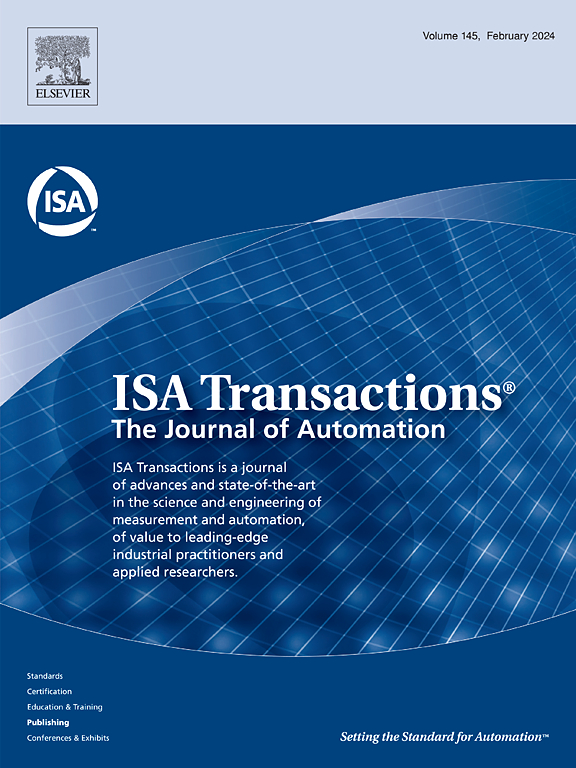A novel performance synthesis method for unknown mismatched disturbances with finite-frequency specifications
IF 6.5
2区 计算机科学
Q1 AUTOMATION & CONTROL SYSTEMS
引用次数: 0
Abstract
A novel synthesis method of disturbance-rejection performance is developed for equivalent-input-disturbance (EID)-based control systems regardless of the unknown and mismatch of disturbances in this paper. It removes the prior assumption on the existence of an EID on the control input channel and guarantees a prescribed finite-frequency performance. First, by treating the Luenberger observer as an ideal dynamic, an auxiliary indicator, i.e., an intermediate variable, is introduced to facilitate performance evaluation. Then, the control mechanism of disturbance-rejection performance is revealed for both single-input, single-output (SISO) and multi-input, multi-output (MIMO) systems with the aid of a commutative condition. More specifically, the commutative condition is always true for SISO systems, but it is a bit challenging to find appropriate parameters such that the commutative condition holds for MIMO systems. To facilitate implementation, a practical commutative condition is developed and used instead of the original commutative condition. Further, taking into account the practical commutative condition, a performance-oriented design algorithm is given, which ensures the prescribed finite-frequency and entire-frequency disturbance-rejection performance requirements. Finally, by comparing with other methods, case studies of a quarter-vehicle suspension system and an MIMO system are carried out to demonstrate the advantages of the developed method.
一种新的有限频域未知失匹配干扰性能综合方法。
针对基于等效输入干扰(EID)的控制系统,提出了一种不考虑未知干扰和失配干扰的抗扰性能综合方法。它消除了先前对控制输入通道上存在EID的假设,并保证了规定的有限频率性能。首先,将Luenberger观测器视为理想动态,引入辅助指标,即中间变量,便于绩效评价。然后,利用交换条件揭示了单输入单输出(SISO)和多输入多输出(MIMO)系统抗扰性能的控制机理。更具体地说,交换条件对于SISO系统总是成立的,但是要找到合适的参数,使交换条件适用于MIMO系统有点困难。为了便于实现,提出了一种实用的交换条件来代替原来的交换条件。在考虑实际交换条件的基础上,提出了一种以性能为导向的设计算法,保证了给定的有限频率和全频率抗干扰性能要求。最后,通过与其他方法的比较,以四分之一车辆悬架系统和MIMO系统为例,验证了所提方法的优越性。
本文章由计算机程序翻译,如有差异,请以英文原文为准。
求助全文
约1分钟内获得全文
求助全文
来源期刊

ISA transactions
工程技术-工程:综合
CiteScore
11.70
自引率
12.30%
发文量
824
审稿时长
4.4 months
期刊介绍:
ISA Transactions serves as a platform for showcasing advancements in measurement and automation, catering to both industrial practitioners and applied researchers. It covers a wide array of topics within measurement, including sensors, signal processing, data analysis, and fault detection, supported by techniques such as artificial intelligence and communication systems. Automation topics encompass control strategies, modelling, system reliability, and maintenance, alongside optimization and human-machine interaction. The journal targets research and development professionals in control systems, process instrumentation, and automation from academia and industry.
 求助内容:
求助内容: 应助结果提醒方式:
应助结果提醒方式:


